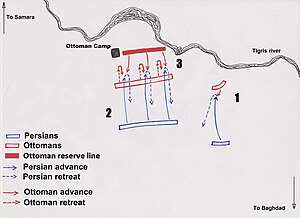Battle of Samarra (1733)
| Ottoman–Persian War (1730–35) | |||||||||
|---|---|---|---|---|---|---|---|---|---|
| Part of Nader's Campaigns | |||||||||
 1 Nader fails to gain an advantage on the Ottoman left due to Topal Pasha's hidden reinforcements which arrived secretly the night before 2 Nader, frustrated by this failure, forms up the core of his army and unleashes an overpowering onslaught on the main Ottoman line pushing the Turks back to very near their encampments 3 Topal Pasha brings forth his reserve line of 20,000 men and restores the situation by driving the Persians back. A brutally intense fight develops with the momentum of the battle swinging like a pendulum in both directions until the Persian army's morale collapses leaving the Ottomans as the clear yet bloodied victors. |
|||||||||
|
|||||||||
| Belligerents | |||||||||
|
|
|
||||||||
| Commanders and leaders | |||||||||
| Nader | Topal Osman Pasha | ||||||||
| Strength | |||||||||
|
70,000
|
80,000
|
||||||||
| Casualties and losses | |||||||||
| 30,000 3,000 captured 500 executed all the cannon & zamburaks |
20,000 | ||||||||
70,000
80,000
The Battle of Samarra was the key engagement between the two great generals Nader & Topal Osman, which led to the siege of Baghdad being lifted, keeping Ottoman Iraq under Istanbul's control. The armed contest between the two colossi was very hard fought with a total of roughly 50,000 men becoming casualties by the end of the fighting that left the Persians decimated and the Ottoman victors badly shaken. Other than its importance in deciding the fate of Baghdad, the battle is also significant as Nader's only battlefield defeat although he would avenge this humiliation at the hands of Topal Pasha at the battle of Agh-Darband where Topal was killed.
Nader had besieged Baghdad with a mighty force of 100,000 fighting men. Constructing towers and trenches all around the city they had placed Baghdad in an iron ring forcing Ahmad Pasha to consider surrender. As negotiations began, Ahmad Pasha was brought news that the greatest general of the empire and former Vizier Topal Osman Pasha had been appointed commander-in-chief of an army of 80,000 men mostly high quality janissaries and sipahi from Istanbul along with 80 guns was marching from the north to relieve Baghdad.
Topal Osman would prove a radically different opponent than any other Nader had faced, yet Nader by now had been victorious so many times that he had perhaps come to believe himself invincible. Leaving 12,000 men behind to enforce the siege he marched north towards Samarra taking with him 70,000 men and dozens of guns.
Nader had also started to divert much of the water streaming into Baghdad in the hope of applying further pressure to the inhabitants, who would in turn conceivably pressure Ahmad Pasha to hand over control of the city and put an end to their privations. This however failed to materialise although an estimated sixty thousand civilians and non military persons lost their lives due to the ruthless implementation of the blockade.
The Persian artillery proved unequal to the task of puncturing the city's stalwart fortifications as it mostly consisted of field artillery- Nader's army at this point lacked any significant siege guns. The only hope for the city's capture was a prolonged starvation of its inhabitants which was going to be an incredibly exacting quest as Baghdad was a huge city with a governor fully aware that the loss of his Eyalat would mean the permanent loss of power as he would almost certainly not be compensated with another.
Topal Osman hailed from Anatolia originally although he was born and raised in the Peloponesse peninsula of Morea. He entered the service of the sultan as a youth and by the age of 24 had risen to the rank of Beylerbey. He was later sent to Egypt though his ship was attacked en route and he was taken to Malta as a prisoner. He was ransomed and released, later partaking in the Pruth River Campaign, which saw Peter the Great decisively beaten, as well as playing a major role in the war with Venice where he particularly distinguished himself, so much so that he was rewarded with the title of Pasha.
...
Wikipedia
